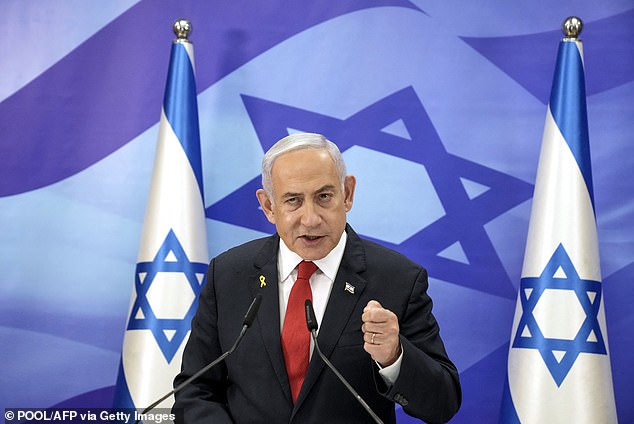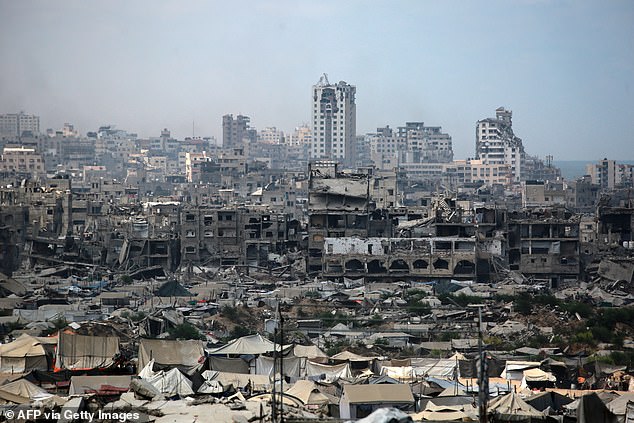Napoleon Bonaparte once received some memorable words of advice from that wily French diplomat and statesman Charles Maurice de Talleyrand-Perigord.
The great general’s ill-judged decision to kidnap and execute a royalist opponent in 1804, which sent shudders of fear around European capitals, was ‘worse than a crime’, remarked Talleyrand. ‘It was a mistake.’
Israeli Prime Minister Benjamin Netanyahu might consider those words as he draws up plans to intensify the war in Gaza. Crime or no crime, he is making a huge mistake.
Why, in ordering a ground assault on densely populated Gaza City – an initiative announced in the early hours of Friday morning – is Netanyahu adopting a policy that splits both Israeli opinion and his own military advisers?
Perhaps a prime minister who has led his country through so many crises for 25 years thinks he can strike a decisive blow and crush Hamas terrorists in their bunkers – as Hitler was eventually destroyed 80 years ago. Israel, for obvious reasons, is haunted by the lessons of the Second World War.
Netanyahu’s supporters point out that Allied forces killed countless thousands of civilians in order to defeat Hitler and Emperor Hirohito of Japan.
Nor should we underestimate the sheer trauma of the bloodshed on October 7, 2023, when Hamas terrorists murdered 1,200 Israeli civilians and took a further 250 hostages to be used, despicably, as human shields. Israel feels its very survival is at stake.
And it is certainly true that Hamas, although crippled, is not eradicated. After 22 months of war, Israel’s campaign of bombs and rockets has reached its limit of effectiveness because so much is destroyed already.

Why, in ordering a ground assault on densely populated Gaza City – an initiative announced in the early hours of Friday – is Netanyahu adopting a policy that splits both Israeli opinion and his own military advisers?
While Israel now controls about 70 per cent of the Gaza Strip, the most heavily populated coastal area and Gaza City itself remain unoccupied. Even in the areas where the Israeli army does hold sway, some fighting continues.
But sending Israeli sons and brothers to fight hand-to-hand in Gaza City’s maze of courtyards and tunnels?
Perhaps the prime minister has been dazzled by the brilliance of Israel’s intelligence strikes against Hezbollah and Iran.
Or by the overwhelming success of its attacks on Hamas, led by planes, rockets and robots of superlative sophistication.
There are personal reasons why Netanyahu might wish to prolong the conflict, of course. His hard-Right coalition partners want the fighting to continue – and without their support, his government falls.
The prime minister is in legal jeopardy, moreover.
While the serious fraud charges levelled against him in three cases at home are unrelated to Gaza, he might well feel that Israel’s continuing state of emergency is essential to prolong his trial. It has worked so far.
And that kicking the can down the road is no more than common sense while he remains in office and out of jail. However, Israel’s military success to date emphatically does not mean it can occupy Gaza City – which still has a population of 800,000 – without enormous bloodshed.

The tragic reality is that the humanitarian situation will worsen radically if Israeli tanks and ground troops attack such a densely populated area
And none are more sceptical than Israel’s own commanders who fear, with good reason, that they are walking into a trap.
The Israel Defence Forces have been mounting raids into Gaza City since 2023; its troops and tanks have faced fierce resistance both above ground and in the darkness below.
Netanyahu is demanding his soldiers clear out a spider’s web of tunnels offering sanctuary for terrorist fighters as well as dungeons for the surviving hostages. Casualties will grow.
Israeli army officers and veterans have already spoken out, fearing the assault will drag soldiers – and Israel itself – into a quagmire.
Relatives of the surviving hostages understandably fear an army offensive will lead to their deaths, too.
The chief of Israel’s Army Staff – no peacenik – suggested that a better alternative was to seal off the remaining Hamas enclaves on the Gaza strip and so prevent them being used to attack Israel itself. But Netanyahu overruled him after a shouting match, according to Israeli media.
It is not just the immediate logistics that cause such grave concern. Comparisons with the Second World War, while tempting, overlook the fact that the Allies gave their enemies a reason to accept defeat. The Americans and British made life better for the survivors in Western Europe and Japan.
But Netanyahu offers no clear picture of The Day After in Gaza.
Trying to allay fears of becoming bogged down, Netanyahu told American TV that he would hand control of the territory to ‘Arab forces’ once Israel has finally defeated Hamas.
But this seems like fantasy. There is no sign that Egypt, Jordan or Saudi Arabia are willing to send troops to police an angry, wounded population which, incidentally, blames Arab states for not helping them in their hour of need.
Nor will Egypt open its doors to Palestinian refugees. Why would it allow Hamas subversives to unite with their friends in Egypt’s radical Muslim Brotherhood, who continue to oppose the Cairo government?
Like it or not, it looks as though Israel will be left holding the Gaza baby, incurring vast costs in blood and treasure to do so.
The reaction is no better elsewhere around the world.
Netanyahu’s plans put Israel at odds with old allies, including Britain and France, and risks handing a propaganda victory to the terrorists.
Populations and politicians across the West offered unflinching support to Israel in the wake of October 7. But almost two years on, the shock of the slaughter is wearing off amid genuine horror at the humanitarian consequences of Israel’s war.
Anyone looking at photographs of the devastation might conclude that the situation in Gaza is now as bad as it could possibly be.
But that’s not true.
The tragic reality is that the humanitarian situation will worsen radically if Israeli tanks and ground troops attack such a densely populated area.
It could further damage Israel’s already strained diplomatic relationships, including its vital friendship with the United States of America.
Without Washington’s support – through military aid, intelligence information and economic support – a small country like Israel simply cannot sustain a ‘forever war’, however tough it likes to think itself.
Despite his strong support for Israel, Donald Trump has repeatedly made clear his revulsion at civilian casualties, whether in Ukraine or Gaza. The US leader wants to be the ‘peace president’, after all.
It would be unwise of Netanyahu to assume that Washington’s guarantee of Israel’s security is the same thing as carte blanche.
If fresh bloodshed upsets the President or complicates America’s relations elsewhere around the world, Trump could well pull the rug from beneath Netanyahu and Israel.
It is by no means unthinkable. Which is why it’s so unwise of Netanyahu to rely on a narrowing base of hard-line supporters inside his parliamentary bunker.
World revulsion at Hamas’s brutal rampage is fading. Alarm at the human cost of the Gaza campaign is growing. And Benjamin Netanyahu, once the great survivor of Israeli politics, would be well-advised to accept it.
A ground war in Gaza City means backing Israel into a dead end – where he, too, will find there’s no escape.
Mark Almond is director of the Crisis Research Institute, Oxford.












